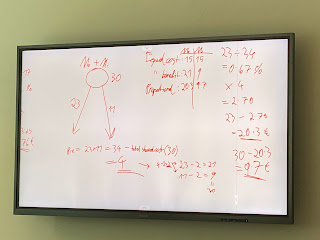World Politics Session 3 and 4
Today, since we were waiting for the rest of the class, we were asked to make a response post for our classmate's learning logs. Then, we listened to Christina, Chanakan and Brendon present their question and answers from yesterday about Democracy and Republic. Then Martin and I answered ours and here is mine:
"Prior to the Meiji Restoration, Japan was ruled by the government of a successive military shōgun. During this period, effective power of the government resided in the Shōgun, who officially ruled the country in the name of the Emperor.
The Meiji Restoration in 1872 led to the resignation of Shōgun. This event restored the country to Imperial rule and the proclamation of the Empire of Japan. In 1889, the Meiji Constitution was adopted in a move to strengthen Japan to the level of western nations, resulting in the first parliamentary system in Asia. It provided a form of mixed constitutional-absolute monarchy, with an independent judiciary, based on the Prussian model of the time.
Following the end of World War II, the present Constitution of Japan was adopted. It replaced the previous Imperial rule with a form of Western-style liberal democracy.
The constitution, also known as the MacArthur Constitution, "Post-war Constitution" or the "Peace Constitution”, was drafted under the supervision of Douglas MacArthur, the Supreme Commander for the Allied Powers, during the Allied occupation of Japan after World War II. Japanese scholars reviewed and modified it before adoption. It changed Japan's previous system of authoritarian semi-constitutional monarchy and stratocracy, which is governed by military forces, with a parliamentary constitutional monarchy, with the emperor as the head of state."
Then after the break, we talked about the word theory. Theory comes from a Greek work that means to look at and it is often used as a synonym for thought conjecture or an idea. Moreover, the theory of World Politics is as a systematic study of observable phenomena that try to discover the principal variables, explain behaviour, and reveal the characteristic types of relations among nation states / countries.
- Liberal internationalism is based on the belief that the current global system is capable of achieving a peaceful world order supported by liberal institutions with states working for mutual benefit, prevention of conflict through diplomacy, strengthening political and economic ties, and supporting the spread of liberal democratic government. Example: European Union and United Nation.
- Realism is more straightforward to international relations, this means that all nations are working together to increase their own power and those countries that manage to hoard power most efficiently will thrive. The nature of this theory implies that seeking a moral high ground is not always achievable and that deceit and violence can be highly effective tools for advancing national interests.
- Constructivism explores why the world is organised the way it is and considers the different factors that shape the durable forms of world politics, and seeks alternative worlds. Not only analyse current behaviour and try to understand why things happen while reviewing history.
Then, we had to prepare a debate on whether we would invade Iraq or not from the perspective of Realism, Liberalism, and Constructivism. For our group, from the perspective of Realists, we agreed that we should not invade Iraq.
First and foremost, instead of spending money on a full-scale invasion, we should de-stabilize the political situation within the country and later introduce our political parties and the terrorism aspect that will not be hiding the fact that the US will use geopolitical advances of the country such as crude oil and fossil fuels in the future, similar to Afghanistan, which was very rich in lithium. Doing this will show that we are clean with our intention and the money that will be mutual between the countries involved. Therefore, making sure that people get proper medicine, education, and peace corps. This will allow us to have a positive presence in the territory of Iraq by giving back to the country that you are taking resources from by creating a more stable political situation and environment not only in Iraq but also neighbouring areas.

Comments
Post a Comment